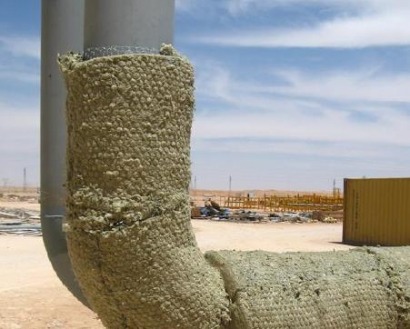
Renovetec has been investigating the cause of a number of fires at CSP plants that not only endanger the lives of operatives on site, but also limit the availability of the plants. “On occasions the causes of the fires have been unclear,” explains Santiago García Garrido, Technical Director of Renovetec, “as the HTF has behaved differently to the specifications on its safety sheet”.
Renovetec has published an article on its work which examines the relationship between the thermal insulation (rock wool) used to line heat transfer piping and the fires, after the company managed to reproduce the conditions leading to certain fires under laboratory conditions.
The tests performed by Renovetec show that the thermal insulation can ignite at below 200ºC, whereby there is a risk of spontaneous combustion even if there is no ignition spark or other ignition source.
“This explains some of the incidents at a number of CSP plants,” says the company, which performed its analysis in February, especially given that the ignition point of the HTF generally used in CSP plants (biphenyl and diphenyl oxide) is 615ºC – a temperature which is highly unlikely to be reached anywhere on site.
Witnesses of some of the fires recall that the incidents arose when some of the HTF escaped from the piping installed in the solar field soaking the thermal insulation (normally rock wool) covered by an aluminium jacket. On removing the aluminium jacket, the rock wool occasionally ignited spontaneously. These fires started despite the technical specifications of the HTF manufactured by Dow Chemical and Solutia indicating that the fluid would not ignite.
The outcome of Renovetec’s experiment to reproduce the conditions leading to the fires is conclusive: on certain occasions the point of spontaneous combustion is not as reflected in the safety sheets of these HTF, with the liquid igniting at temperatures below 203ºC. “A specific compound in the rock wool could be to blame for this decrease in ignition point,” says the company, “possibly due to the presence of a catalyst that provokes combustion”.
Renovetec has notified the rock wool manufacturer (Rockwool) and the HTF manufacturer (Dow Chemical) of its findings. As a result, Dow Chemical now includes information on the possible risk of spontaneous combustion in the safety sheet.
“Given these results, Renovetec recommends that the managers of operational CSP plants and those in charge of building new plants, as well as insurance companies covering these fires replace the thermal insulation used to cover the HTF piping with a different type of insulation that does not have behave in the same way,” highlights García.
For additional information:

